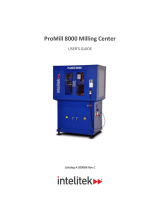
Canned cycles (·M· model)
CNC 8060
CNC 8065
·14·
(REF: 1807)
SOFT PROFILE EDITOR
Profile editor.
Allows for the part profiles to be edited graphically and to
import dxf files.
SOFT HD GRAPHICS
HD graphics.
High definition solid 3D graphics for the execution and
simulation of part-programs and canned cycles of the
editor.
During machining, the HD graphics display, in real time,
the tool removing the material from the part, allowing the
condition of the part to be seen at all times. HD graphics
can display up to 4 views of the part, where each can be
rotated, zoomed in or zoomed out. Measurements can
also be made on the part and even sections on the piece
from any angle.
In a multi-channel system, this feature requires the MP-
PLUS (83700201) processor.
SOFT RTCP
Dynamic RTCP (Rotating Tool Center Point).
The dynamic RTCP option is required for interpolation
machining with 4, 5 or 6 axis.
This feature requires the MP-PLUS (83700201)
processor.
SOFT C AXIS
C axis.
It activates the kinematics for working with the C axis and
the associated canned cycles. The CNC can control
several C axes. The parameters of each axis indicate if it
will function as a C axis or not, where it will not be
necessary to activate another axis for the machine
parameters.
SOFT Y AXIS
Y axis for lathe.
It activates the kinematics for working with the Y axis and
the associated canned cycles.
SOFT TANDEM AXES
Tandem axes.
A tandem axis consists in two motors mechanically
coupled (slaved) and making up a single transmission
system (axis or spindle). A tandem axis helps provide the
necessary torque to move an axis when a single motor is
not capable of supplying enough torque to do it.
When activating this feature, it should be kept in mind that
for each tandem axis of the machine, another axis must be
added to the entire configuration. For example, on a large
3-axis lathe (X Z and tailstock), if the tailstock is a tandem
axis, the final purchase order for the machine must
indicate 4 axes.
SOFT SYNCHRONISM
Synchronization of axes and spindles.
The axes and ballscrews may be synchronized in two
ways: in terms of speed or position. The CNC
configuration takes into consideration the synchronization
of 2 axes or 2 spindles. Once synchronized, only the
master displays and programs the element.
SOFT KINEMATIC CALIBRATION
Kinematics calibration.
This work mode may be used to calibrate kinematics for
the first time and to re-calibrate it every so often to correct
any possible deviations originated by the day-to-day
machine work.
SOFT HSSA II MACHINING SYSTEM
HSSA-II machining system.
This is the new version of algorithms for high speed
machining (HSC). This new HSSA algorithm allows for
high speed machining optimization, where higher cutting
speeds, smoother contours, a better surface finishing and
greater precision are achieved.
SOFT TANGENTIAL CONTROL
Tangential control.
"Tangential Control" maintains a rotary axis always in the
same orientation with respect to the programmed tool
path. The machining path is defined on the axes of the
active plane and the CNC maintains the orientation of the
rotary axis along the entire tool path.
SOFT PROBE
Probing canned cycles.
The CNC may have two probes; usually a tabletop probe
to calibrate tools and a measuring probe to measure the
part.
This option activates the functions G100, G103 and G104
(for probe movements) and probe canned cycles (which
help to measure part surfaces and to calibrate tools).
SOFT CONV USER CYCLES
Conversational user cycles.
Incorporation of user cycles in conversational mode.
SOFT 70 PROGTL3
ProGTL3 programming language
Another language apart from ISO for the programming of
profiles using a geometric language without the need to
use external CAD systems. This language allows for
program functions to define lines and circles which define
the points of intersection on a profile, in addition to macros
for the creation of solids defined by a flat profile and one
or more section profiles.
SOFT PPTRANS
Part-program translator.
The program translator may be used to convert programs
written in other languages into Fagor ISO codes.
SOFT THIRD PARTY CANOPEN
Third-party CANopen.
Enables the use of non-Fagor CANopen modules.
SOFT FVC UP TO 10m3
SOFT FVC MORE TO 10m3
Medium and large volumetric compensation.
5-axis machines are generally used during the
manufacturing of large parts. The accuracy of the parts is
limited by the machine manufacturing tolerances and is
effected by temperature variations during machining.
In sectors such as the aerospace industry, machining
demands mean that classic compensation tools are
becoming suboptimal. Volumetric compensation FVC
comes in to complement the machine adjusting tools.
When mapping the total work volume of the machine, the
CNC knows the exact position of the tool at all times. After
applying the required compensation, the resulting part is
made with the desired precision and tolerance.
There are 2 choices, which depend on the size of the
machine, being up to 10 m³ and over 10 m³.
DMC
Dynamic Machinning Control.
DMC adapts the feedrate during machining to maintain the
cutting power as close as possible to ideal machining
conditions.




















